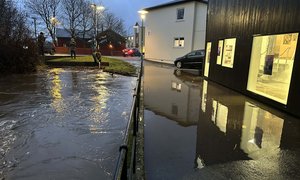FAROE Law
By Eyðfinnur Jacobsen, Attorney-at-law
I Introduction
Income tax payment is part of everyday life for the Faroese people. Most Faroese taxpayers pay income tax as this is considered an appropriate way of financing the services that a modern society has to offer. Income tax is paid with the presumption that it has been assessed and collected in accordance with rules that are applicable to all Faroese citizens.
In recent years an increasing number of special rules concerning income taxation have been enacted in the Faroe Islands. These special rules are primarily concerned with taxation on income derived from shipping and taxation on income derived from hydrocarbon activities. As regards income derived from shipping, reference is made to the rules applying to the Faroese International Register of Ships (FAS) that came into force in the beginning of the 90?ies and the rules of taxation on crew?s wages that came into force in the second half of the 90?ies. As regards taxation on income derived from hydrocarbon activities, a special legislation came into force for the first time 19 February 1999.
II Shipping
The special rules in this field apply partly to FAS and partly to diversified taxation on crew?s wages. The objective of the FAS arrangement is that the shipping companies get refunded a part of the wages paid to their employees. The objective of the special rules for taxation on crew?s wages is that the crew?s wages are taxed more favourable than wages earned on shore. The reasons for implementing these special rules are in both cases based on a wish to create competitiveness between Faroese and foreign taxpayers.
A. Faroese International Register of Ships (FAS)
A.1 Refund to the Shipping Company
According to this rule the Faroese shipping company is entitled to get refunded a part of the wages, presently 28%, paid to crew performing services:
1. on board a vessel registered under the Faroese International Register of Ships (FAS)
or
2. on board a vessel of 100 GRT or above, fishing vessels excluded, registered abroad, which is bare-boat leased by a Faroese shipping company (bare-boat registration).
It is directly established in the Tax Act that the rules of refunding wages are not applicable to services performed
1. on board a vessel registered with home port in the Faroe Islands that is bare-boat leased to a foreign company solely for the purpose of commercial transportation of persons and/or goods
or
2. on board oil rigs within Faroese waters.
In order to be covered by FAS it is also necessary that the ship owner in question is a resident in the Faroe Islands. If the ship owner is a company it has to be registered in the Faroe Islands and its real head office has to be located in the Faroe Islands. Lastly, the crew in question has to be subject to tax liability to the Faroe Islands.
A.2. Taxation on crew
Wages covered by FAS are reduced by 15% before tax assessment takes place. The part of the wages exceeding 500,000 DKK, however, will not be reduced. The reduction, therefore, only affects annual wages of 500,000 DKK or less. The taxable income assessed like this, is taxed in accordance with ordinary tax rates. Crew subject to limited tax liability to the Faroe Islands is taxed by 42% of the taxable income assessed by the thus reduced income.
B. Taxation on crew?s wages
The changes that came into force 1 January 1998 resulted in five different taxation options on crew?s wages as differentiation has to be made between 1) wages earned on board fishing vessels (catch-wages) and 2) other wages earned at sea on board on A) vessels registered under FAS; B) foreign vessels; C) Faroese vessels, which are not registered under FAS, fishing vessels excluded; and D) vessels registered under the Danish International Shipping Register (DIS), respectively.
B1. Catch-wages.
Similar to taxation on crew?s-wages on vessels registered under FAS, as explained above, catch-wages on fishing vessels are reduced by 15% before tax assessment takes place. Also in this case it is only the part of 500,000 DKK or less that is reduced. The taxable income assessed like this is taxed in accordance with the ordinary tax rates. The same applies to limited tax liability as explained earlier under taxation on crew?s wages earned on board vessels registered under FAS.
B2. Wages earned on board vessels registered under FAS
Please refer to the previous comments on wages earned on vessels registered under FAS.
B3. Wages earned on board foreign vessels, fishing vessels excluded.
The annual wages earned on board a foreign vessel of this type are reduced by a basic amount of 50,000 DDK and subsequently by 15% of the first 200,000 DDK and by 8% of the remainder, up to wage share up to 350,000 DDK. The taxable income assessed like this is taxed at a reduced rate of 35%.
Foreign vessels falling within the scope of these rules are vessels, which solely carry out commercial transport of persons and/or goods between Faroese and foreign ports or between foreign ports, including vessels which are used as rescue vessels and which are not registered with home port in the Faroe Islands. Also foreign vessels and other floating equipment, which are used in connection with exploration and exploitation of hydrocarbons outside Faroese waters, are considered as foreign vessels in this context.
B4. Wages earned on board Faroese vessels, fishing vessels excluded, not registered under FAS.
These wages are, as presently, taxed as wages on shore.
B5 Wages earned on board vessels registered under DIS.
Tax on wages earned on board vessels registered under DIS is, as presently, taxed by 0 DKK.
III Hydrocarbon Activities
According to the special rules governing taxation on hydrocarbon all activities carried out within the Faroese territory relating to preliminary investigations, exploration for and exploitation of hydrocarbons and activities related thereto are taxable. The hydrocarbon tax regime extend the scope of the ordinary tax liability to the Faroese Treasury so that everyone in the Faroese territory (e.g. sea territory, sea bed, subsoil, and the Faroese continental shelf sector) dealing with hydrocarbon activities or activities related thereto, are liable to pay tax to the Faroese Treasury despite the fact that they according to the ordinary rules do not have this liability.
Income derived from exploration and exploitation of hydrocarbons is divided into two groups. One group consists of income derived directly from exploitation of resources (Section 4 income) and the other group consists of »derivative income«, for example income from investigations (and sale of the results therefrom), supply services and other similar activities.
A. Section 4 Income.
This category includes:
a) revenue on the first sale of exploited hydrocarbons;
b) revenue fixed as a share of the exploited hydrocarbons or the value thereof;
c) gains or losses on direct or indirect assignment of a license, permit or right to carry out preliminary investigations, exploration or exploitation of hydrocarbons; and
d) gains or losses on assignment of plant and machinery, ships and buildings solely used in relation to preliminary investigations, exploration for and exploitation of hydrocarbon.
Section 4 income is taxed by 27% whether the business is run by a company or by an individual. This type of income is assessed independently (ring fenced), and the income tax is calculated of this income separately. Consequently, when taxable income is assessed, loss derived from other activities can not be deducted in Section 4 income. Tax has to be paid in three equal installments on 1 October, 1 November, and 1 December of the following year.
B »Derivative Income«
This type of income is in short, all other income derived from hydrocarbon activities not included in mentioned Section 4 income.
The decision on what tax rate to use on »derivative income« may be a complex one because there are several alternatives, depending on whether the taxpayer is (1) a wage earner (employee) or an (independent) businessman; (2) if the businessman runs his enterprise as a company or as an individual (sole proprietor); (3) and if the wage earner (employee) or the (independent) businessman is tax liable according to the Hydrocarbon Tax Act; or in addition subject to the ordinary tax legislation.
B1 Tax liability subject to both the Hydrocarbon Tax Act and subject to the ordinary tax legislation
If the wage earner or the businessman is tax liable subject to both the Hydrocarbon Tax Act and subject to the ordinary tax legislation, the »derivative income« shall be added to the ordinary income and be taxed as such. In this situation different tax rates may apply depending on whether the tax payer has full or limited tax liability to the Faroe Islands, and if the enterprise is run as a company or by an individual. Wage earners and enterprises run by individuals subject to full tax liability pay tax up to 50% of the taxable income according to a progressive scale, while wage earners and enterprises run by individuals subject to limited tax liability pay up to 42% of the gross income. Companies pay tax by 20% of the taxable income, irrespective of full or limited tax liability to the Faroe Islands.
B2. Tax liability subject to the Hydrocarbon Act only.
B2.a. Wage Earners.
If the wage earner is tax liable subject to the Hydrocarbon Tax Act only, he has to pay a definitive tax of 35% of his gross income. It also means that the wage earner shall not submit a Personal Income Tax Return, but that the employer in question must transfer his wages through an approved Faroese clearinghouse in order for the tax to be withheld.
B2.b. Enterprises
Enterprises run by individuals who are tax liable subject to the Hydrocarbon Tax Act only, pay tax derived from »derivative income« by 35%, while enterprises run as a company that is tax liable subject to the Hydrocarbon Tax Act only, pay tax on »derivative income« by 20%.
C. Tax Rates.
As is apparent from what I have outlined above, the tax liability is of great importance for the tax rates on »derivative income« from hydrocarbon activities for wage earners and enteprises run by individuals because the lower tax rate of 35% depends on whether the taxpayer in question is tax liable according to the Hydrocarbon Tax Act only. The moment the same taxpayer also has full or limited tax liability according to the ordinary tax legislation, the tax rate increases to 42% of his gross income or up to 50% according to a progressive scale of the taxable income, respectively.
IV Tax Planning
This brief presentation of the changes in the Faroese income taxation in recent years should make it clear, that they have affected the situation of both wage earners and enterprises. The changes introduced differ from the prevailing income tax rules. This is with reference to special rules, that offer tax advantages to a group of taxpayers doing business in shipping, and special rules that extend the basis for taxation by levying tax on incomes deriving from hydrocarbon activities within the whole of the Faroese territory.
For shipping and hydrocarbon activities alike it my be of significant importance in relation to the fiscal position as well as in relation to the tax payers financial position, how the business enterprises/activities have been structured. Important features may be, (1) where the operational equipment is located/registered, (2) in what geographical area the businesses are carried out, (3) for how long time the activities have been carried out, etc. The same issues relate to wage earners as it is of fiscal and therefore of financial importance whether they have signed on a vessel under FAS or DIS. In relation to hydrocarbon activities it may have fiscal and with that financial importance to the wage earner, whether he is tax liable subject to the Hydrocarbon Tax Act only or to the ordinary tax legislation applying for the Faroes as well.
The more special rules, the better it permits the taxpayer to plan his own state of affairs with the resulting difference in fiscal and financial outcomes, and ultimately how much income tax, he wishes to pay. Having in mind the changes during the past 10 years, where new special income tax rules continuously have been enacted in the Faroe Islands, we may no longer need to put forward the question whether tax planning is required, but rather to recognize that these developments have made tax planning a natural, necessary and prudent part of everyday life.














